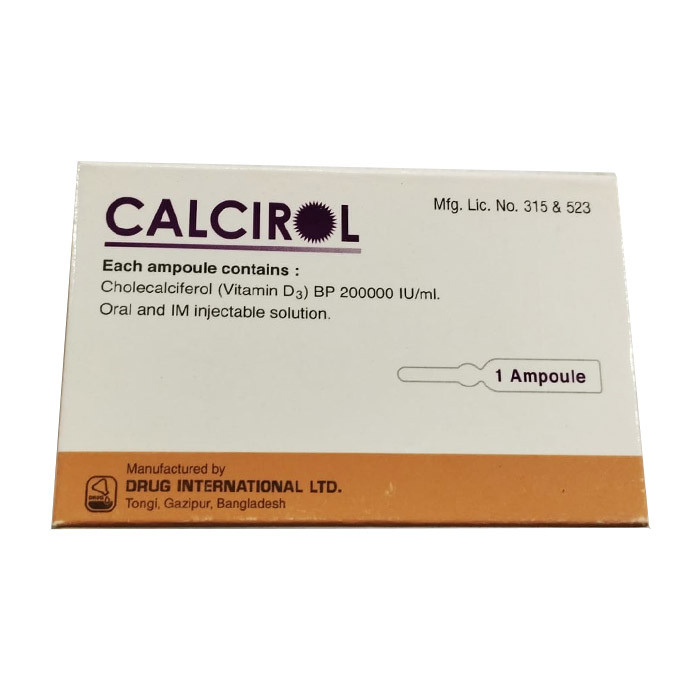

✔ 100% Authentic Product
👁️ Currently Viewing 2895
D-Rise 40000 Capsule 10pcs
D-Rise 40000 is a medication used to treat and prevent vitamin D3 deficiency, aiding in the absorption of calcium and phosphorus for normal bone growth and density. It also has benefits for lung function, bacterial infections, cancer prevention, and type 2 diabetes management.

100% Genuine Products, Guaranteed
Safe & Secure Payments, Always
Fast, Secure & Efficient Delivery
Proper Packaging
 Cash on Delivery - All over Bangladesh
Cash on Delivery - All over Bangladesh Regular Delivery - 8-12 Hours, Dhaka City*
Regular Delivery - 8-12 Hours, Dhaka City* Regular Delivery - 24-48 Hours, All Over Bangladesh*
Regular Delivery - 24-48 Hours, All Over Bangladesh*
✅ Description:
- D-Rise 40000 is a capsule containing Cholecalciferol (Vitamin D3) 40,000 IU.
- Cholecalciferol is known as the "sunshine vitamin" as it is synthesized in the skin when exposed to sunlight.
- It helps prevent and treat Vitamin D deficiency symptoms such as muscle weakness, joint pain, mood swings, and depression.
- It can also help maintain bone health, prevent osteoporosis and improve lung function.
- D-Rise 40000 is a vital supplement for overall healthy body functioning.
Safety Advices

Alcohol
No Information Found

Pregnancy
CONSULT YOUR DOCTOR
Studies have demonstrated that doses up to 40000IU of vitamin D3 are safe to use during pregnancy. The recommended daily intake for pregnant women is 40000IU of vitamin D3, but a higher dose may be necessary for women with a deficiency. Pregnant women should always follow their doctor's advice, as their vitamin D3 requirements may vary depending on the severity of their condition and response to treatment.

Breastfeeding
CONSULT YOUR DOCTOR
When a nursing mother takes D-Rise 40000, the vitamin and its metabolites are excreted in her breast milk. So far, there have been no reported cases of infant overdose caused by vitamin D3 from breast milk. However, it is important for physicians to consider the mother's intake of vitamin D3 when prescribing additional supplements for a breastfed child.

Driving
SAFE
D-Rise 40000 does not affect your ability to drive.

Kidney
No information found

Liver
No information found
✔️ Uses of D-Rise 40000:
- Treatment and prevention of vitamin D3 deficiency
- Osteoporosis
- Hypoparathyroidism
- Rickets
- Osteomalacia,
✔️ Side Effects of D-Rise 40000:
General side effects include-
- Hypercalcemia
- Hypercalciuria
- Rash
- Itching
- Hives
- Nausea and
- Abdominal pain.
✔️ How to use D-Rise 40000:
- As prescribed by your medical practitioner.
- D-Rise 40000 capsule is taken whole orally with water, preferably after the meal.
✔️ Quick Suggestions of D-Rise 40000:
- Taking D-Rise 40000 with fat helps it absorb better
- It helps in strengthening the bones and muscles in the body
- It helps enhance the immune system
- Helps elevate mood and boost energy levels
- It can help manage blood sugar and blood pressure
✔️ Indications of D-Rise 40000:
D-Rise 40000 is suitable for the treatment and prevention of vitamin D3 deficiency. It can also be used as an adjunct to the specific treatment of osteoporosis in patients with vitamin D3 deficiency.
✔️ Pharmacology of D-Rise 40000:
Absorption and reabsorption of calcium and phosphorus in the body. Vitamin D3 is essential for normal bone growth and the maintenance of bone density.
In addition to its role in bone health, vitamin D3 has other potential benefits. It may help reduce the severity of bacterial infections and improve lung function. There is some evidence suggesting that adequate vitamin D levels may reduce the risk of certain cancers, such as breast cancer and colorectal cancer. However, it's important to note that further research is needed to fully understand the relationship between vitamin D and cancer prevention.
Furthermore, vitamin D3 may also be beneficial for individuals with type 2 diabetes. It can help maintain adequate insulin levels, which is important for blood sugar regulation in these patients. However, it's important to note that vitamin D3 is not a substitute for standard diabetes management and should be used as part of a comprehensive treatment plan under the guidance of a healthcare professional.
✔️ Dosage & Administration of D-Rise 40000:
The recommended dosages for vitamin D3 capsules are as follows:
For Adults:
- Treatment of vitamin D3 deficiency: The initial dose is 40,000 IU once a week for 7 weeks. Afterward, a maintenance dose of 1,400-2,000 IU per day is recommended. The target level of 25-hydroxyvitamin D should be determined through a blood test 3-4 months after starting the maintenance therapy.
- Prevention of vitamin D3 deficiency: The recommended dose is 20,000 IU every 4 weeks. In some cases, higher doses may be needed.
- Supplement to specific treatments for osteoporosis: A monthly dose of 20,000 IU is suggested.
For Children (12-18 years):
- Treatment of vitamin D3 deficiency: The recommended dosage is 20,000 IU once every 2 weeks for a total of 6 weeks.
- Prevention of vitamin D3 deficiency: The suggested dose is 20,000 IU every 6 weeks.
It's important to note that these dosages are general recommendations and may vary based on individual factors and specific medical conditions. It's advisable to consult with a healthcare professional or follow their prescribed regimen for accurate dosing instructions tailored to your specific needs. Regular monitoring and follow-up with a healthcare provider are essential to ensure optimal vitamin D levels and to address any potential side effects or interactions.
✔️ Interaction of D-Rise 40000:
- Thiazide diuretics, calcium, or phosphate: When taken together, there is an increased risk of hypercalcemia (high levels of calcium in the blood). This means that caution should be exercised when combining these substances with vitamin D3 capsules.
- Antiepileptic medications (e.g., carbamazepine, phenobarbitone, phenytoin, and primidone): These medications may increase the requirements for vitamin D, meaning that higher doses of vitamin D3 may be needed for adequate supplementation.
- Rifampicin and isoniazid: These medications may reduce the effectiveness of vitamin D3.
- Corticosteroids: Corticosteroids may counteract the effects of vitamin D, potentially reducing its effectiveness.
- Digoxin or cardiac glycosides: It is important to note that vitamin D3 capsules may interact with digoxin or other cardiac glycosides, but the specific nature of this interaction was not mentioned.
- Reduced absorption: Certain substances, such as cholestyramine, colestipol, mineral oil, or orlistat, can reduce the absorption of vitamin D3 when taken together. It is advisable to separate the administration of these substances from the intake of vitamin D3 capsules.
- Ketoconazole: Ketoconazole may interact with vitamin D3, but the details of this interaction were not specified.
✔️ Contraindications of D-Rise 40000:
Patients known to be allergic to vitamin D3 are contraindicated.
✔️ Pregnancy & Lactation:
Research has indicated that doses of vitamin D3 up to 4000 IU per day can be used safely during pregnancy. The recommended daily intake for pregnant women is typically 400 IU, but in cases where a deficiency in vitamin D3 is identified, a higher dose may be necessary. It's important for pregnant women to consult with their healthcare provider for guidance, as individual needs may vary based on the severity of the deficiency and the response to treatment.
Vitamin D3 and its metabolites are excreted in human milk. While there have been no observed cases of infant overdose resulting from vitamin D3 consumed through breastfeeding, it is still important to consider any additional vitamin D3 supplements given to the breastfeeding mother when prescribing vitamin D3 for the infant. Healthcare professionals should take into account the overall vitamin D3 intake of both the mother and the nursing child to ensure appropriate supplementation.
It is crucial for pregnant and breastfeeding women to work closely with their healthcare providers to determine the appropriate dosage and duration of vitamin D3 supplementation, taking into consideration their individual circumstances and any potential risks or benefits.
✔️ Precautions & Warnings of D-Rise 40000:
- High blood calcium or phosphorus levels: Taking vitamin D supplements may further increase calcium or phosphorus levels in individuals who already have elevated levels, which can lead to health complications.
- Heart problems: People with existing heart conditions should be cautious with vitamin D supplementation, as high doses may affect cardiovascular health. It's advisable to consult with a healthcare professional before starting any new supplement regimen.
- Kidney disease: Individuals with kidney disease may have difficulty processing vitamin D properly. Vitamin D supplementation should be carefully managed under the guidance of a healthcare professional in these cases.
✔️ Storage Conditions of D-Rise 40000:
Keep the temperature below 30º C, protected from light and humidity. Keep out of the reach of children.
Disclaimer:
ePharma sole intention is to ensure that its consumers get proper
information as musch as possible. Although we do not guarantee the
accuracy and the completeness of the information that provided and
here information is for informational purposes only.
The information contained herein should NOT be used as a substitute
for the advice of a qualified physician. This may not cover
everything about particular health conditions,
lab tests, medicines, all possible side effects, drug interactions,
warnings, alerts, etc. Please consult your healthcare professional
and discuss all your queries related to any disease or medicine. We
intend to support, not replace, the doctor-patient relationship.


























